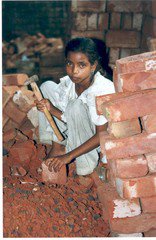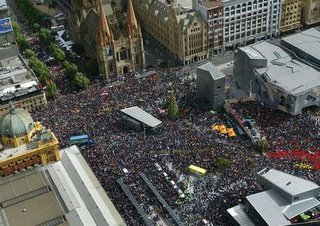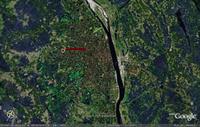...when the PM watches a riot influenced by race and says, "but I do not want to say that Aussies are racist"
It makes me sick
...when people take "Waltzing Matilda" and sing it as a war cry to attack fellow Australians.
It makes me angry
...when an ocker bloke grabs a young girl's head scarf and runs off with it as if its a trophy.
It is not surprising that a lot of people, including the media, wish to discern the one central factor which has lead to the Cronulla race-riots last week - and they wonder is it race, alcohol, heat, youth, testosterone... rather than being ready to examine the complex interplay of these factors and more. Whatever the case, reading Bonhoeffer in the lead up to Christmas has been a good choice...
Wednesday, December 14, 2005
Sunday, December 04, 2005
Scarcity vs. Abundance
Photo from Unicef website:
Breaking up bricks in Bangladesh
I was reading Walter Brueggemann yesterday and read some of what he says about scarcity vs. abundance. The Israelites in the wilderness were dependent upon God for manna. When you believe in the 'story of scarcity', you hoard, keep, hide away what you have. If you believe in the 'story of abundance' on the other hand, you can afford to be generous, to give up what you have. God initiated this abundance, and it is played out in the story of Jesus. Joseph presided over seven years of abundance followed by seven years of famine. People also experience times of scarcity and times of abundance.
Last week at nightchurch, two guys sat up the front breaking up bricks while the service went on. They weren't very good at it, or perhaps they were trying not to be too loud, but they were reminding us of the over 1 billion people in the world who live on $1 a day. I remember in Bangladesh, seeing people on the side of the road, usually women or children, breaking up bricks. The problem was there were no natural stones in Bangladesh, so the only way to make stones to lay bitumen for the roads was first to make bricks and then to break them.
Our society is fueled by a market ideology that encourages us to take more all the time and to fear scarcity. Sabbath, says Brueggemann is intended to be an antidote to our activity and an acknowledgement of abundance. Grace is not simply a theological thing, it is to be an action of our lives. What is your story? Is it one of scarcity or abundance?
Breaking up bricks in Bangladesh

I was reading Walter Brueggemann yesterday and read some of what he says about scarcity vs. abundance. The Israelites in the wilderness were dependent upon God for manna. When you believe in the 'story of scarcity', you hoard, keep, hide away what you have. If you believe in the 'story of abundance' on the other hand, you can afford to be generous, to give up what you have. God initiated this abundance, and it is played out in the story of Jesus. Joseph presided over seven years of abundance followed by seven years of famine. People also experience times of scarcity and times of abundance.
Last week at nightchurch, two guys sat up the front breaking up bricks while the service went on. They weren't very good at it, or perhaps they were trying not to be too loud, but they were reminding us of the over 1 billion people in the world who live on $1 a day. I remember in Bangladesh, seeing people on the side of the road, usually women or children, breaking up bricks. The problem was there were no natural stones in Bangladesh, so the only way to make stones to lay bitumen for the roads was first to make bricks and then to break them.
Our society is fueled by a market ideology that encourages us to take more all the time and to fear scarcity. Sabbath, says Brueggemann is intended to be an antidote to our activity and an acknowledgement of abundance. Grace is not simply a theological thing, it is to be an action of our lives. What is your story? Is it one of scarcity or abundance?
Monday, November 28, 2005
A letter to the Prime Minister
Dear Prime Minister John Howard,
On Friday, 2nd December, Nguyen Tuong Van is due to be executed in Singapore. Nguyen made a terrible mistake, attempting to take drugs back to Australia, was caught and is now on death row.
On Friday, you are planning to play cricket for the Prime Minister's XI. Do you really think this is appropriate? Australia does not support the death penalty. Australians have come out to say Nguyen should not pay for his mistake by losing his life and you too have supported this view.
It is simply a callous act for you to be gallivanting down the pitch, and wearing the baggy green, as Nguyen walks his death walk. Nguyen's mother and Nguyen himself were 'blown away' that you took the time out to meet her. How do you think she is going to feel now? You say you "think the Australian people will understand". Do you think his mother will understand? It is simply a respectful act, Mr Howard to leave the cricket aside on Friday as a protest against the barbarism of the death penalty - which in terms of justice is a lie.
Sincerely,
Gwyn
If you too are interested in emailing John Howard, follow this link..
http://www.pm.gov.au/email.cfm
On Friday, 2nd December, Nguyen Tuong Van is due to be executed in Singapore. Nguyen made a terrible mistake, attempting to take drugs back to Australia, was caught and is now on death row.
On Friday, you are planning to play cricket for the Prime Minister's XI. Do you really think this is appropriate? Australia does not support the death penalty. Australians have come out to say Nguyen should not pay for his mistake by losing his life and you too have supported this view.
It is simply a callous act for you to be gallivanting down the pitch, and wearing the baggy green, as Nguyen walks his death walk. Nguyen's mother and Nguyen himself were 'blown away' that you took the time out to meet her. How do you think she is going to feel now? You say you "think the Australian people will understand". Do you think his mother will understand? It is simply a respectful act, Mr Howard to leave the cricket aside on Friday as a protest against the barbarism of the death penalty - which in terms of justice is a lie.
Sincerely,
Gwyn
If you too are interested in emailing John Howard, follow this link..
http://www.pm.gov.au/email.cfm
Tuesday, November 15, 2005
Striking at the Heart of Melbourne


Melbourne was today the scene of a huge workers’ protest. Helicopter estimates were at about the 175000 level. Thousands of people had obviously decided, like me, that the new Industrial Relations Laws are bad enough news to be docked a days pay and were on strike. Above is the scene as it looked from the steps of St Paul’s Cathedral.
In the photo taken from a helicopter, you can see the church which we were standing in front of.
Monday, November 14, 2005
What is Politics?
According to the Collins English Dictionary, 3rd Edition, politics is the practice or study of the art and science of forming, directing, and administrating states and other political units; the art and science of government; political science; any activity concerned with the acquisition of power, gaining one's own ends. (My emphasis).
Politics may refer to leadership or to the business of controlling or governing. It can be about self-fulfilment and selfishness; in other words my rights over another persons’ rights. What is the difference between good leadership and despotism? The human political sphere, important as it is, is rarely, if ever, all-embracing. It is distorted by self-fulfilling politics, it discriminates, marginalises and disfigures. The Church has been associated with this disfigurement and discrimination frequently.
Jűrgen Moltmann has argued that ‘"monotheistic monarchianism" …has provided a theological justification for structures of domination and subordination in the familial, political, and ecclesial realms of human existence.’ God understood as primarily King has distorted human understanding of how government is to be formed. God understood in this way is above us, the monarch, laying down the law. Too often this is still the case today. Do you agree with Moltmann? How do you think the church can get away from this monotheistic monarchianism? Or can it?
Politics may refer to leadership or to the business of controlling or governing. It can be about self-fulfilment and selfishness; in other words my rights over another persons’ rights. What is the difference between good leadership and despotism? The human political sphere, important as it is, is rarely, if ever, all-embracing. It is distorted by self-fulfilling politics, it discriminates, marginalises and disfigures. The Church has been associated with this disfigurement and discrimination frequently.
Jűrgen Moltmann has argued that ‘"monotheistic monarchianism" …has provided a theological justification for structures of domination and subordination in the familial, political, and ecclesial realms of human existence.’ God understood as primarily King has distorted human understanding of how government is to be formed. God understood in this way is above us, the monarch, laying down the law. Too often this is still the case today. Do you agree with Moltmann? How do you think the church can get away from this monotheistic monarchianism? Or can it?
Thursday, November 10, 2005
Resurrection

I've just finished my essay on Greek words for 'Resurrection' in the original biblical text. I've also just had an exam on Koine Greek, which was tough to say the least. Here is a copy of the mindmap I made up to help me with the essay...
As you can see, there are a lot of words which English often just translates as resurrection! One of the most interesting, I think, is Zohpoiew, which translates as 'to make life'. God, as demonstrated by the resurrection, which by the way is something I have 'faith' in - I agree that it can't be historically proven... hmm could talk more about that at a later stage... is a God who 'makes life' definitively and therefore opposes death and violence...
Thursday, October 20, 2005
The Unofficial take on Aichi World Expo 2005 - Mammoth heads, robots and the Private School club

World Expo was like a Private School Fair, to which the public schools were also invited. (obviously a public school teacher writing!)
It was clear who had the bigger budgets, but not always obvious what their message was. The biggest purse strings were held by the corporations such as Hit.... and Toy... (Toyota city is located next to the Nagakute site), Mitsu.... and so on. These were also the most popular exhibitions. Hit.... scored a 6 hour wait in queue on our last day there, 140 000 visitors were there that day.
Queues will be a lasting memory of the Expo for many visitors, with the initial line up for entry at 9am, queues at pavilions, queues for drinks, queues at the restaurants and of course queues to buy souvenirs at the end of the day. Finally, crowds waited for up to an hour to get on the uni-directional "Linimo" Hover train back to Nagoya.
"Nature's Wisdom" was the 'theme' of the expo, although Nature actually struggled to be heard. Still, France's pavilion, offered a film, flashing images on to four walls and the roof. Sobering images included dying wildlife; huge stockpiles of trash and desparate people, to remind the private school brigade of the rest of the world out there. That is those who were listening!
There were plenty who weren't interested in the messages. What is the Japanese' love affair with Theme Parks and spectaculars? Walking through some pavilions, it was difficult to stop and even think about interpretations with the pressure of the crowd to keep moving. Some were always in search of another "sight", or "experience". These included an 88 metre Ferris Wheel; the biggest Kaleidescope in the World (Certified by Guinness); the head of a mammoth transferred from Siberian permafrost to Nagoya; a pink fluoro Mt Fuji; giant TV screen and a re-created house from the Japanese popular anime, "Tonari-no-totoro". The final show on the "Koi pond" at 8pm included images of a monkey on a spraying water screen and a giant Snow Monkey head, which rose up from the water of the lake and then slowly revolved in a grotesque 360 degree loop.
The Expo outwardly expressed environmental concerns. Alongside the "global loop", a path encircled the site, where there were occasional sets of 8-10 rubbish bins, all for a different type of rubbish. Separating their garbage seemed to assuage the consciences of thousands of people daily adding to incredible piles of waste.
The public school pavilions, such as Bangladesh, Mongolia, Pacific Islands had no lines and consisted largely of small commerce, selling knick knacks, crafts and clothes.
In all of this, there were some glimmers of hope. The NGO pavilion, showcasing non-government programs. The removal of mines, assistance for AIDS victims, reminders of fair trade and the "other". The Be Good Organic vegetarian cafe, a simple demonstration of the alternative to mass-produced and consumerist, chemical soaked foods. Indigenous representation in even some of the "private school" pavilions.

I wonder whether the coming Commonwealth Games in Melbourne will reflect the original unfair trade set up by the original British Empire. Is that all these multi-national events are set up to be? Are we really going to cheer Australia's success in the pool, as opposed to Fiji, Bangladesh and Zambia? My hope is that the political system will one day be turned on its head. Whatever the case, in the meantime, isn't it possible for us to deal less in deathly ecological and political destruction and re-discover what is really important in our world?
Monday, October 17, 2005
My new blog


I think the reason I have called my new blog, "The World is a big place" is because I don't particularly feel like an Aussie, I am actually from all over the place. In an effort to introduce myself, I thought I would talk about some of the places I am from! Also, I'm a geography/Japanese high school teacher. As such, I am really enjoying at the moment having a go at a new program put out by a big net presence that starts with G. I can look at all the places where I used to live. For example, Mymensingh in Bangladesh, is the first picture here. I lived here for three years, from about 1980 until 1982. Here is a recent photo from Mymensingh - thanks O.

The second picture is of Nakamura in Kochi Prefecture, Japan. I lived here between 1998 and 2000. I realised, looking at the pictures, that both are next to important rivers. The Brahmaputra in Bangladesh and the Shimanto in Kochi. Both flooded while I lived there, when swollen, they are awesome and frightening. Has anyone else used Google Earth to have a look at a different perspective of their living place?
Subscribe to:
Posts (Atom)